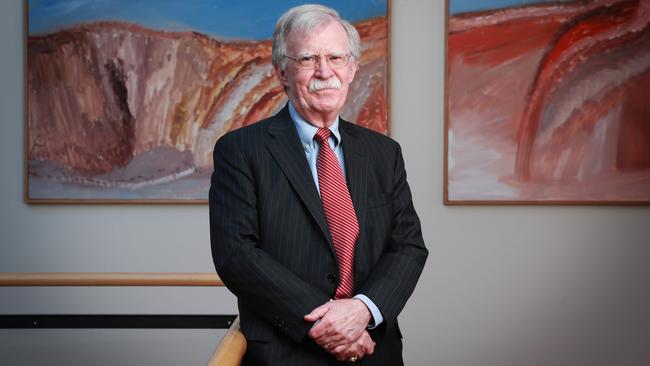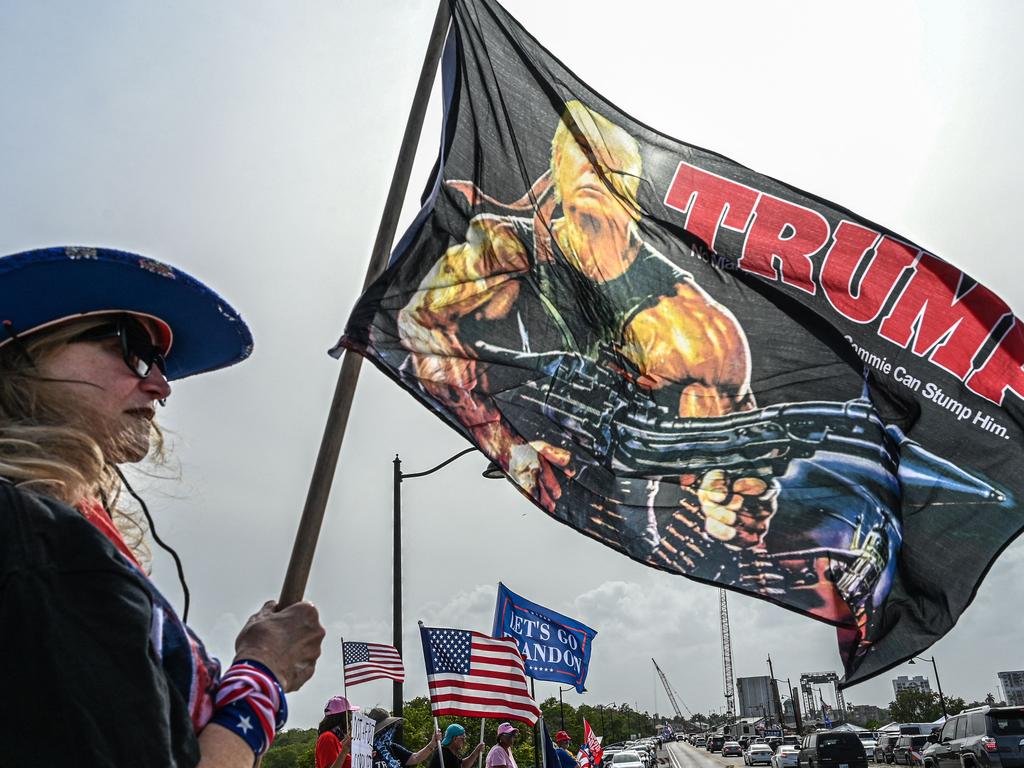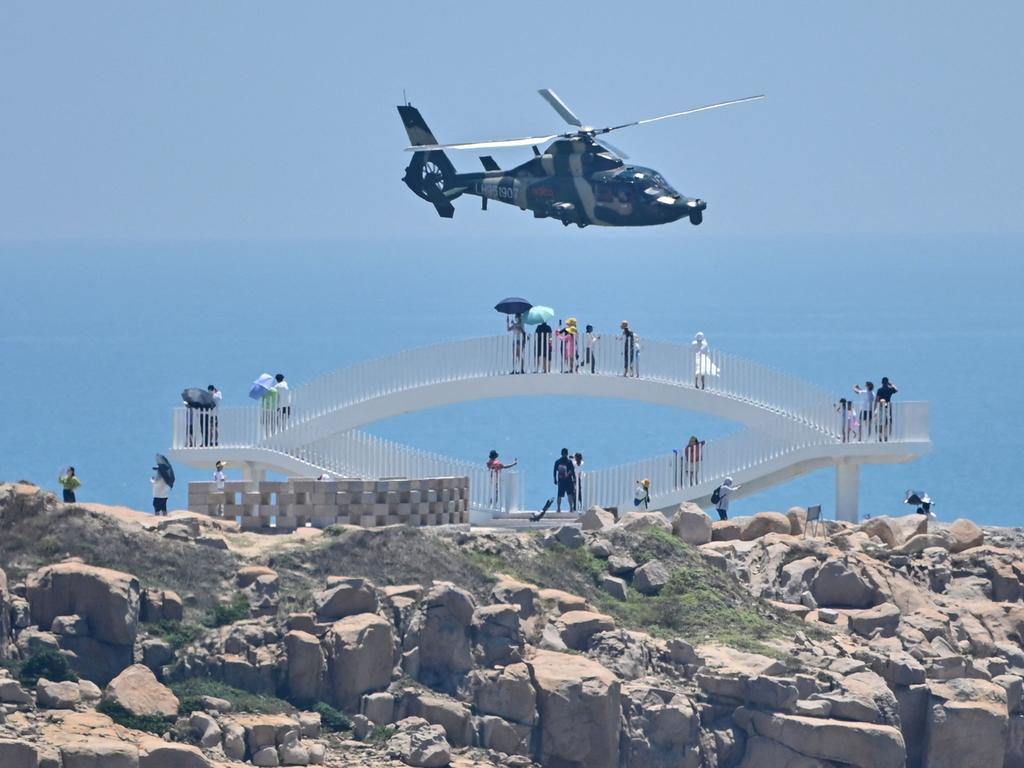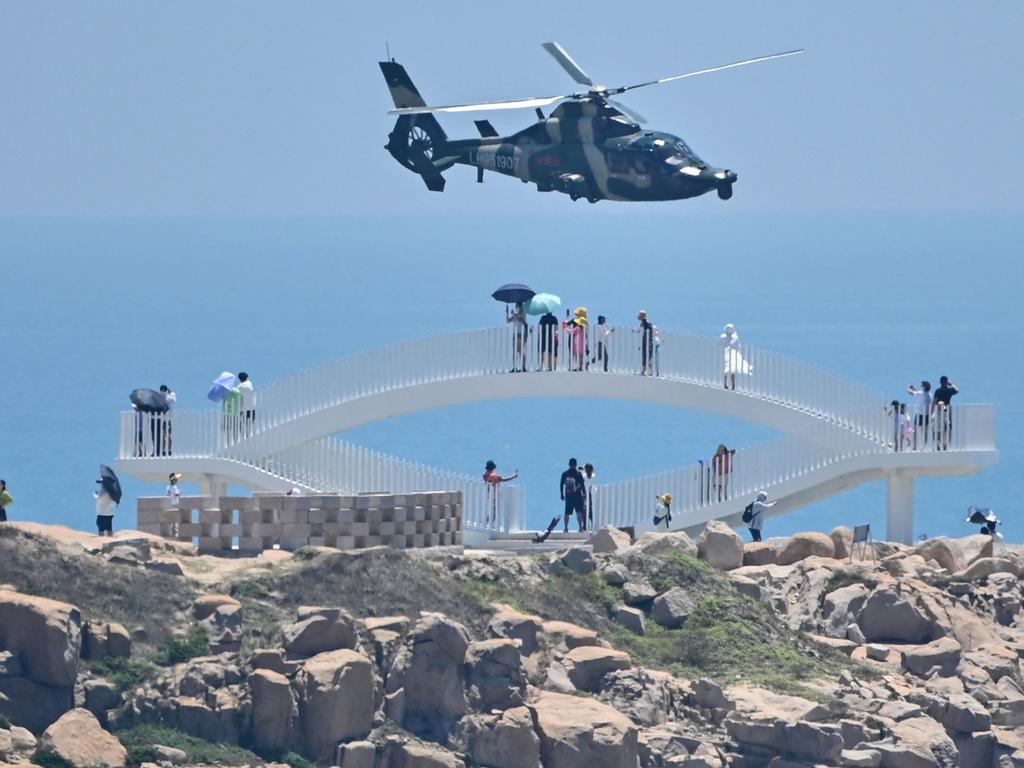Don’t leave Xi Jinping guessing on backing for Taiwan: John Bolton
Taiwan needs to be treated as an independent country and the notion of strategic ambiguity abandoned, says the former US national security adviser.

Taiwan needs to be treated as an independent country and the notion of strategic ambiguity in relation to defending it should be abandoned, Donald Trump’s former national security adviser, John Bolton, says.
In a sharp warning to both sides of Australian politics, Bolton said any future Republican president, other than Trump, could be expected to change American policy and recognise Taiwan – a stance in conflict with both the Albanese government and Dutton opposition, and guaranteed to create serious problems for Australia.
Bolton said the key to Taiwan’s future was to “enmesh” the island in collective security arrangements that would deter Chinese President Xi Jinping from a military solution since any failure would also threaten his own regime – another shock to Australian thinking.
Repudiating critics who assert the US is no longer a reliable military partner because of a crisis within its democracy, Bolton branded such thinking as “woefully ill-informed” and said there was no challenge to US democracy or its constitutional system “in any way, shape or form”.
“I don’t think we will see a second Trump presidency,” Bolton said. “I think if he gets the Republican nomination in 2024 it will be a catastrophe for the Republican Party. Trump knows he lost in 2020 though he’ll never admit that. He fears losing in 2024. He hates being called a loser and wouldn’t want that.”
In a forceful exposition Bolton said the challenges from Russia and China were not “two separate phenomena” but those nations had formed an “entente” and America and the West must grasp this co-ordinated threat that might yet become an alliance.
Bolton, now a strong critic of Trump, praised the strategic outlook of both the former Turnbull and Morrison governments, saying they had helped the United States overcome its “blind” spots in relation to China, nominating the Huawei decision under Malcolm Turnbull and the focus on the Pacific under Scott Morrison.
Interviewed during his visit to Australia to deliver the annual Centre for Independent Studies lecture, Bolton said: “I think we should adjust and deal with Taiwan as an independent country because that’s what it is and successful foreign policies are usually grounded in reality, not an illusion.
“The people on the island now identify far more as Taiwanese than as Chinese. It is a democratic government, it meets all the customary international law tests of statehood. And to treat it as anything other than a functioning sovereign government just blinks at reality. How governments express that is subject to debate.
“I would abandon strategic ambiguity. It has served its purpose from the time it was first enunciated in the Shanghai Communique in 1972. But times have changed in 50 years. The argument has to be on any given day what contributes most to peace and stability within the region and I think ambiguity now undermines peace and security.”
Strategic ambiguity is the notion that by not declaring whether it will defend Taiwan the US creates both a disincentive for Beijing’s military adventurism and an incentive for Taiwan to be reassured and not opt for independence, thereby retaining the status quo.
Bolton warned the Republican Party was shifting on Taiwan. “I think it’s a near certainty among Republican candidates for the 2024 presidential nomination, other than Donald Trump, that they would in fact recognise Taiwan,” Bolton said. “Even the Biden administration, which says it wants to maintain strategic ambiguity, has done things like inviting Taiwan’s representative in the US, Hsiao Bi-khim, to attend the inauguration, which was unprecedented since 1979.
If Bolton’s predictions are realised this guarantees profound challenges for Australian foreign policy in relation to Taiwan, China and the US. The idea of no change to the status quo is entrenched ALP policy.
Bolton is an enthusiastic supporter of recent Australian moves – the AUKUS nuclear submarine arrangement with the US, UK and Australia, and the elevation of the Quad to leaders’ level involving Japan, the US, Australia and India. He urged Australia to become “a first mover” in the region, operating in the Indo-Pacific “along China’s periphery” where “there are lots of combinations, partnerships, alliances that can be formed”. “The bigger question is how to deter China over the longer-term,” Bolton said. “The answer to that is you enmesh Taiwan in the bigger regional collective security organisations.
“If the question remains: China versus Taiwan, there comes a point where Taiwan loses. That’s just automatic. But if it’s a bigger question then I think it’s easier to deter China.
“China doesn’t want to fight over Taiwan – read Sun-Tzu – it wants to take Taiwan by creating a pretext, perhaps by having a blockade and see if the United States fails to come to Taiwan’s side. If that happened, then China would gain hegemony and annexation follows almost automatically.
“But if Xi Jinping saw deterrence of sufficient strength that he would perceive failure as more likely than success, then he won’t go ahead. The risk for him is making the bet the US won’t come to Taiwan’s side and, if he’s wrong, that is regime threatening for him.”
Bolton was scathing about the risk posed by any second Trump presidency. Having held high posts in the Republican administrations of Ronald Reagan, George HW Bush and George W Bush, he resigned as Trump’s national security adviser in September 2019 after a series of differences with the president.
“Trump has no philosophy,” Bolton said. “He doesn’t do policy the way most people understand that.” Bolton predicted that if Trump had won the 2020 election he “would have been back, trying to negotiate the biggest trade deal in history with China, as he called it, the deal of the century”.
Bolton said Trump admired Xi and the two leaders had flattered each other.
He predicted Trump would talking constantly for the next couple of years about running and “may even announce he’s going to run, but I still think he won’t do it”. While an intense critic of Trump, Bolton said American democracy would recover.
“Trump, unquestionably, caused damage to the United States, to the Republican Party, to our reputation internationally,” he said. “But it’s all repairable. There’s no threat to democracy. We’ve seen threats to democracy before, we’ve had a civil war, that was a threat to democracy. This is a time of intensely partisan politics, but it’s not a challenge to the constitutional system.”
Bolton is deeply worried about Ukraine. He said NATO was not providing enough support and the sanctions against Russia were not effective enough.
He said of NATO: “There is a lot of division under a very thin layer of unity.” He feared that if President Vladimir Putin sought a diplomatic solution the Europeans would concur with the risk that a quarter of the country could be lost.








To join the conversation, please log in. Don't have an account? Register
Join the conversation, you are commenting as Logout